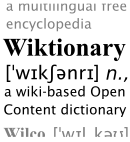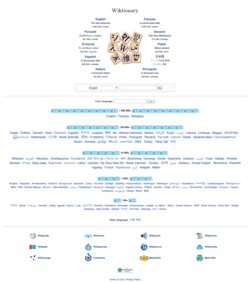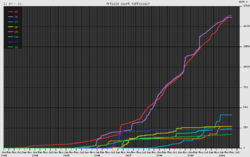Wiktionary
From Wikipedia, the free encyclopedia
  |
|
 Screenshot of wiktionary.org home page |
|
| URL | http://www.wiktionary.org/ |
|---|---|
| Slogan | The Free Dictionary |
| Commercial? | No |
| Type of site | Online dictionary |
| Registration | Optional |
| Available language(s) | Multi-lingual (over 150) |
| Owner | Wikimedia Foundation |
| Created by | Jimmy Wales and the Wikimedia community |
| Launched | December 12, 2002 |
| Alexa rank | 1104 |
| Current status | active |
Wiktionary (a portmanteau of the words wiki and dictionary) is a multilingual, Web-based project to create a free content dictionary, available in over 151 languages. Unlike standard dictionaries, it is written collaboratively by volunteers, dubbed "Wiktionarians", using wiki software, allowing articles to be changed by almost anyone with access to the website.
Like its sister project Wikipedia, Wiktionary is run by the Wikimedia Foundation. Because Wiktionary is not limited by print space considerations, most of Wiktionary's language editions provide definitions and translations of words from many languages, and some editions offer additional information typically found in thesauri and lexicons. Additionally, the English Wiktionary includes Wikisaurus, a category that serves as a thesaurus, including lists of slang words,[1] and the Simple English Wiktionary, compiled using the Basic English subset of the English language.
Contents |
History and development
Wiktionary was brought online on December 12, 2002, following a proposal by Daniel Alston.[citation needed] On March 29, 2004, the first non-English Wiktionaries were initiated in French and Polish. Wiktionaries in numerous other languages have since been started. Wiktionary was hosted on a temporary URL (wiktionary.wikipedia.org) until May 1, 2004, when it switched to the current full URL.[2] As of November 2008[update], Wiktionary features well over 3 million entries across its 272 language editions. The largest of the language editions is the French Wiktionary, with over 1,145,000 entries. English Wiktionary was surpassed in early 2006 by the French Wiktionary, only to regain the top position in September 2006. French later overtook English again, but in August 2008, English Wiktionary overtook French again. During September 2008, the French and English Wiktionaries traded top position twice more. In October 2008, French overtook English. English is currently the second largest with over 1,110,000 entries. Nine Wiktionary language editions now contain over 100,000 entries each.

Despite Wiktionary's large number of entries, most of the entries and many of the definitions at the project's largest language editions were created by bots that found creative ways to generate entries or (rarely) automatically imported thousands of entries from previously-published dictionaries. Seven of the 18 bots registered at the English Wiktionary[3] created 163,000 of the entries there.[4] Only 259 entries remain (each containing many definitions) on Wiktionary from the original import by Websterbot from public domain sources; the majority of those imports have been split out to thousands of proper entries manually. Another one of these bots, "ThirdPersBot," was responsible for the addition of a number of third-person conjugations that would not receive their own entries in standard dictionaries; for instance, it defined "smoulders" as the "third-person singular simple present form of smoulder." Excluding these 163,000 entries, the English Wiktionary would have about 137,000 entries, including terms unique to languages other than English, making it smaller than most monolingual print dictionaries. The Oxford English Dictionary, for instance, has 615,000 headwords, while Merriam-Webster's Third New International Dictionary of the English Language, Unabridged has 475,000 entries (with many additional embedded headwords). It should be noted, though, that more detailed statistics now exist to more clearly distinguish genuine entries from minor (small) entries.
The English Wiktionary, however does not rely on bots to the extent that somewhat smaller editions do. The French and Vietnamese Wiktionaries, for example, imported large sections of the Free Vietnamese Dictionary Project (FVDP), which provides free content bilingual dictionaries to and from Vietnamese.[5] These imported entries make up virtually all of the Vietnamese edition's offering. Like the English edition, the French Wiktionary has imported the approximately 20,000 entries in the Unihan database of Chinese, Japanese, and Korean characters. The French Wiktionary grew rapidly in 2006 thanks in large part to bots copying many entries from old, freely-licensed dictionaries, such as the eighth edition of the Dictionnaire de l'Académie française (1935, around 35,000 words), and using bots to add words from other Wiktionary editions with French translations. The Russian edition grew by nearly 80,000 entries as "LXbot" added boilerplate entries (with headings, but without definitions) for words in English and German.[6]
Most of Wiktionary currently uses a textual logo designed by Brion Vibber, a MediaWiki developer.[7] Despite frequent discussion of modifying or replacing the logo, a four-phase contest held at the Wikimedia Meta-Wiki from September to October 2006[8] did not see as much participation from the Wiktionary community as some community members had hoped. The logo that won was designed by "Smurrayinchester". As of June 2007, seventeen of the Wiktionary editions – French, Turkish, Vietnamese, Arabic, Italian, Swedish, Korean, Dutch, Lithuanian, Persian, Sicilian, Ukrainian, Albanian, Simple English, Corsican, Wolof, and Yiddish – have switched to the contest-chosen logo or variations of it. The remaining editions use either the textual logo or, in the case of the Galician Wiktionary, a logo that depicts a dictionary bearing the Galician coat of arms.
Critical reception
Critical reception of Wiktionary has been mixed. Jill Lepore wrote in the article "Noah’s Ark" for The New Yorker, (November 6, 2006)[9]
There’s no show of hands at Wiktionary. There’s not even an editorial staff. "Be your own lexicographer!", might be Wiktionary’s motto. Who needs experts? Why pay good money for a dictionary written by lexicographers when we can cobble one together ourselves?
Wiktionary isn’t so much republican or democratic as Maoist. And it’s only as good as the copyright-expired books from which it pilfers. If you look up the word "Webster" in the Wiktionary, you will be redirected to this handy tip:
But, hey, at least they got his first name right.Noah Webster’s New International Dictionary of the English Language, 1911 (published by Merriam-Webster, Springfield, MA) is a public domain dictionary, as is a 1913 edition, that can be used to empower Wiktionary with more definitions.
Keir Graff’s review for Booklist was less critical:
Is there a place for Wiktionary? Undoubtedly. The industry and enthusiasm of its many creators are proof that there’s a market. And it’s wonderful to have another strong source to use when searching the odd terms that pop up in today’s fast-changing world and the online environment. But as with so many Web sources (including this column), it’s best used by sophisticated users in conjunction with more reputable sources.
References in other publications are fleeting and part of larger discussions of Wikipedia, not progressing beyond a definition, although David Brooks in The Nashua Telegraph described it as wild and woolly.[10] (Wooly is defined as "confused" and "unrestrained."[11]) One of the impediments to independent coverage of Wiktionary is the continuing confusion that it is merely an extension of Wikipedia.[12] In 2005, PC Magazine rated Wiktionary as one of the Internet's "Top 101 Web Sites,"[13] although little information was given about the site.
Wiktionary statistics
| No. | Language | Language (local) | Wiki | Entries | Total | Edits | Admins | Users | Images | Updated |
|---|---|---|---|---|---|---|---|---|---|---|
| 1 | French | Français | fr | 1125065 | 1181647 | 3847448 | 22 | 9714 | 21 | 2008-11-17 12:33:06 |
| 2 | English | English | en | 1053934 | 1160035 | 5686640 | 81 | 109494 | 9 | 2008-11-17 12:33:29 |
| 3 | Turkish | Türkçe | tr | 251797 | 282579 | 605130 | 8 | 4929 | 72 | 2008-11-17 12:33:32 |
| 4 | Vietnamese | Tiếng Việt | vi | 228098 | 235128 | 837090 | 3 | 2759 | 10 | 2008-11-17 12:30:03 |
| 5 | Russian | Русский | ru | 184570 | 368299 | 976668 | 4 | 3618 | 129 | 2008-11-17 12:33:37 |
| 6 | Ido | Ido | io | 141979 | 174863 | 732499 | 1 | 607 | 0 | 2008-11-17 12:31:44 |
| 7 | Greek | Ελληνικά | el | 117058 | 232261 | 1321306 | 7 | 1370 | 38 | 2008-11-17 12:30:51 |
| 8 | Chinese | 中文 | zh | 116358 | 135106 | 533003 | 6 | 6091 | 197 | 2008-11-17 12:32:31 |
| 9 | Polish | Polski | pl | 105430 | 118395 | 779222 | 18 | 4403 | 104 | 2008-11-17 12:32:06 |
| 10 | Tamil | தமிழ் | ta | 102389 | 105279 | 188294 | 7 | 781 | 160 | 2008-11-17 12:31:15 |
See also
References
- ^ See "Creating a Wikisaurus entry" for information on the structure of Wikisaurus entries. An example of a well-formatted entry would be "Wikisaurus:insane".
- ^ Wiktionary's current URL is www.wiktionary.org.
- ^ The user list at the English Wiktionary identifies accounts that have been given "bot status".
- ^ TheDaveBot, TheCheatBot, Websterbot, PastBot, NanshuBot
- ^ Hồ Ngọc Đức, Free Vietnamese Dictionary Project. Details at the Vietnamese Wiktionary.
- ^ LXbot
- ^ "Wiktionary talk:Wiktionary Logo", English Wiktionary, Wikimedia Foundation.
- ^ "Wiktionary/logo", Meta-Wiki, Wikimedia Foundation.
- ^ The full article is not available on-line. Jill Lepore (6 November 2006). "Noah's Ark" (Abstract). The New Yorker. http://www.newyorker.com/archive/2006/11/06/061106fa_fact_lepore. Retrieved on 2007-04-21.
- ^ David Brooks, "Online, interactive encyclopedia not just for geeks anymore, because everyone seems to need it now, more than ever!" The Nashua Telegraph (August 4, 2004)
- ^ "wooly". Wiktionary. http://en.wiktionary.org/wiki/wooly.
- ^ In this citation, the author refers to Wiktionary as part of the Wikipedia site: Adapted from an article by Naomi DeTullio (2006 (1st Quarter)). "Wikis for Librarians" (PDF newsletter). NETLS News #142 (Northeast Texas Library System): p. 15. http://www.netls.org/NewContent/NewsAndPictures/NEWSLETTERS/NEWS2006/142final.pdf. Retrieved on 2007-04-21.
- ^ "Wiktionary". Top 101 Web Sites. PC Magazine. 2005-04-06. http://www.pcmag.com/article2/0,1895,1786207,00.asp. Retrieved on 2005-12-16.
- ^ List of Wiktionary editions, ranked by article count. Accessed June 25, 2007.
External links
| Look up Wiktionary in Wiktionary, the free dictionary. |
| Simple English edition of Wiktionary, the free dictionary/thesaurus |
- Wiktionary front page
- Wiktionary's Multilingual Statistics
- Wikimedia's page on Wiktionary (including list of all existing Wiktionaries)
- Pages about Wiktionary in Meta.
- Meta:Main Page - OmegaWiki
|
|||||

